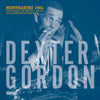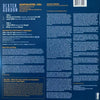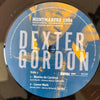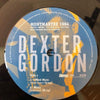







Dexter Gordon - Montmartre 1964
Tenor Saxophone, Vocals – Dexter Gordon [click here to see more vinyl featuring Dexter Gordon]
Bass – Niels-Henning Ørsted Pedersen [click here to see more vinyl featuring Niels Henning Orsted Pedersen]
Drums – Alex Riel
Piano – Tete Montoliu
Written by Antônio Maria (A1), Luiz Bonfá (A1), Johnny Richards (A2), Sonny Stitt (A2), Dexter Gordon (B1), Erroll Garner (B2)
1 LP, standard sleeve
Original analog Master tape : YES
Heavy Press : 180g
Record color : black
Speed : 33 RPM
Size : 12'’
Stereo
Live
Record Press : unspecified
Label : Storyville Records
Original Label : Storyville Records
Recorded at Jazzhus Montmartre Copenhagen, 20th (side B) & 28th (side A) July 1964
Remastered by Jørgen Vad
Originally released in 2020
Tracks:
Side A:
- Manha de Carnival
- Loose Walk
Side B:
- I Want More
- Misty
Reviews:
“Dexter Gordon lived in Europe for 14 years. It was obviously congenial because during that period he produced some of his best work. When Bertrand Tavernier wanted to include an iconic jazz figure in his film ‘Round Midnight’, Dexter was the obvious candidate: tall, hip, stylish, relaxed, the epitome of cool profundity, wreathed in cigarette smoke.
Dexter in his European period was beyond innovating, he had come to rely on his great rhythmic sense and a tone as wide as a redwood, as warm as toast, as fluid as cognac and, above all authentic. Swirling in his wake was his time with Lionel Hampton, his duels with Wardell Grey, his bruising brush with narcotics.
NHOP was nineteen at the time of the recording, just at the beginning of a career that would take him to play with most of the major figures of the sixties and seventies. His bass sound at the period of the recording lacked the subtlety and intricacy that he would show later in life, here he was ensuring that the rhythm was solid and effective.
Tete Montoliu had a phenomenal technique. The ideas that occurred in his head could be transmitted instantly to his fingers. Why he was never better known is a jazz mystery.
House drummer at this time, at the Jazzhus, Alex Riel on this album shows a technique that veers from Syd Catlett to Tony Williams. He is asked mainly just to keep time.
In a spirited ‘Loose Walk’ Dexter creates a solo that moves from sprinkled quotes to an urgent exploration of the theme. He has the ability to construct a solo to pull his listeners into his thought processes so that they accompany the tall man all the way.
It was not unusual to hear ‘Manha de Carnaval’ by Luiz Bonfa In 1964. Dexter enjoys the rhythm and Riel drums well without dominating or becoming repetitive.
‘Misty’ has a big theme that appeals to Dexter and at first he does not move far from the melody. When he moves away his embellishments are intriguing, shadowing the theme. He is so confident, imperious, the way he moves forward.
There was no one like Dexter. This album is taken from a great night with the Dexter Gordon quartet. The players were used to each other and there is an ease about their relationship. If you were there you would not forget being in the presence of the charismatic giant who would have provided you with everything that you expected.
This album of performances, being released here for the first time, recaptures the spell of Dexter Gordon’s first arrival on the Danish jazz scene in 1964. As drummer Alex Riel recalls, the rapport between Gordon and his Danish audiences wasn’t something he had to work on; it was just “there” from the first time he started playing for them.
Gordon really shines on this performance of Sonny Stitt’s Loose Walk, showing off his fluent technique and, at this stage in his career, a bit more willingness to take chances in his solos. Yet to be honest, I found Tete Montoliu’s piano solo even more daring and original—this is clearly one of the highlights of the album—and Ørsted-Pedersen is similarly brilliant here. And throughout these performances, I was really surprised by the exceptional clarity of sound. They almost sound as if they were made yesterday, that’s how good they are.
Indeed, as this program continues one is as much if not more impressed by the pianist and bassist as by Gordon. Dexter just always seemed to me a player on the brink of being an artist without quite reaching the heights, and this program does not change my mind. Of course, this doesn’t mean that he was a poor jazz musician, only that he wasn’t quite in the top tier, but after decades of living in Denmark he returned to the U.S. where he made the film ‘Round Midnight and became a legend.” Jazz Blues News, Novembre 2020
Ratings :
Discogs : 4.88 / 5



